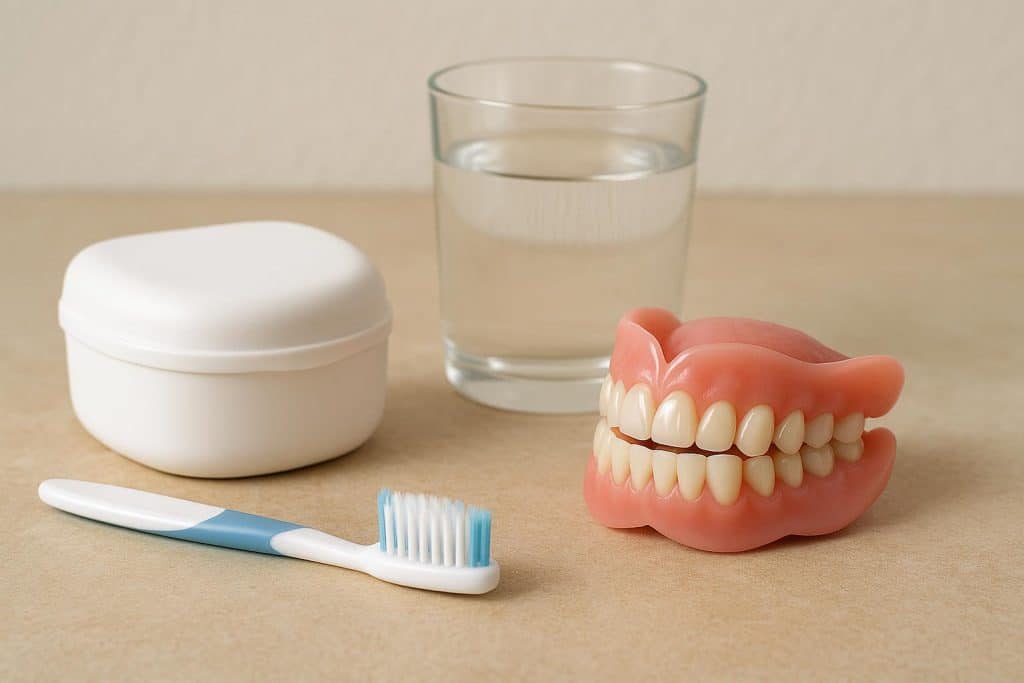Dentures are custom-made replacements for missing teeth that help you eat, speak, and smile comfortably again. They bring back your confidence and make everyday life easier. Just as natural teeth do, dentures also need regular care to stay in good condition. So, let’s explore some ways to protect your dentures from damage and keep them in great shape with help from your dentist in Kyle, TX.
Types of dentures
There are different dentures for specific needs.1 If you’re not sure which one is for you, consult with your dentist to learn more about your options. Here are some common types of dentures:
- Full dentures are used when all teeth in the upper or lower jaw are missing. They rest on the gums and replace an entire set of teeth.
- Partial dentures are made for people who still have some natural teeth. These dentures fill your gaps and can help keep your remaining teeth in place.
- Immediate dentures are placed right after tooth removal, so you do not have to go without teeth while your mouth heals.
- Implant-retained dentures are attached to dental implants in the jawbone to replace missing tooth roots.
How to protect dentures from damage
Let’s look at some practical steps you can take to protect your dentures from damage:
1. Clean after eating
Every time you eat with your dentures on, rinse them with water to remove any food debris or other loose particles. Clean your natural teeth, tongue, cheeks, and palate (the roof of your mouth). If you do not want to remove your dentures repeatedly, you can get permanent dentures because they stay fixed and can only be removed by your dentist. Ask your dentist to find out if permanent dentures could be the right solution for you.
2. Handle your dentures with care
Your dentures are made to be strong, but that doesn’t mean they are unbreakable. A minor accident, such as dropping them on a hard surface, may crack them. So, whenever you take them out to clean, place them over a folded towel or in a sink filled with water, so if they slip from your hand, they can fall on a soft surface.
3. Brush them daily
Just like natural teeth, dentures also need regular cleanings to prevent stains, bacterial buildup, and odor.2 For this, you should use a soft-bristled toothbrush or a denture brush with a non-abrasive toothpaste. Try to avoid regular toothpaste because it can be too harsh and leave scratches on the surface. Then, once you’re done brushing, rinse your dentures well with water to remove any leftover cleaner.
4. Soak dentures overnight
It’s best to soak your dentures overnight to keep them in good condition and ready for use the next day. So, whenever you’re not wearing your dentures, place them in a moist environment like a denture soaking solution. This keeps them from drying out, which may cause them to lose their shape or develop cracks. Avoid soaking them in hot or boiling water, as it can change their shape.3
5. Watch what you eat
When you first get dentures, it may take a little time to get used to eating with them. Avoid hard or sticky foods, as they may put extra pressure on your dentures, potentially causing discomfort when wearing them.
Start with soft and light foods like mashed potatoes, oatmeal, yogurt, or steamed vegetables. Try cutting foods into smaller pieces and chewing slowly on both sides of your mouth to distribute pressure evenly. Once you are comfortable with them, gradually return to your favorite meals. But always consult your dentist if any food causes you discomfort.
6. Schedule timely dental visits
Even if your dentures feel comfortable, visit your dentist’s office every few months. Your gums and jaw can change over time, and that can affect how your dentures fit.4 That’s why regular checkups are quite helpful. They help catch minor issues before they become bigger, more expensive problems.
7. Don’t use chemical products
Avoid products that contain bleach because bleach can weaken and change the color of the pink part of the dentures. In fact, if you have dentures with metal attachments, don’t even soak them in chlorine solutions; otherwise, the metal will lose its shine and start to erode. In addition to these, avoid smoking, tea, and red wine, as they can also stain dentures.
The bottom line
A few daily habits can make a big difference in how long your dentures last. When you handle them with care, clean them daily, and consult your dentist if you have any issues, you protect both your dentures and your smile.
